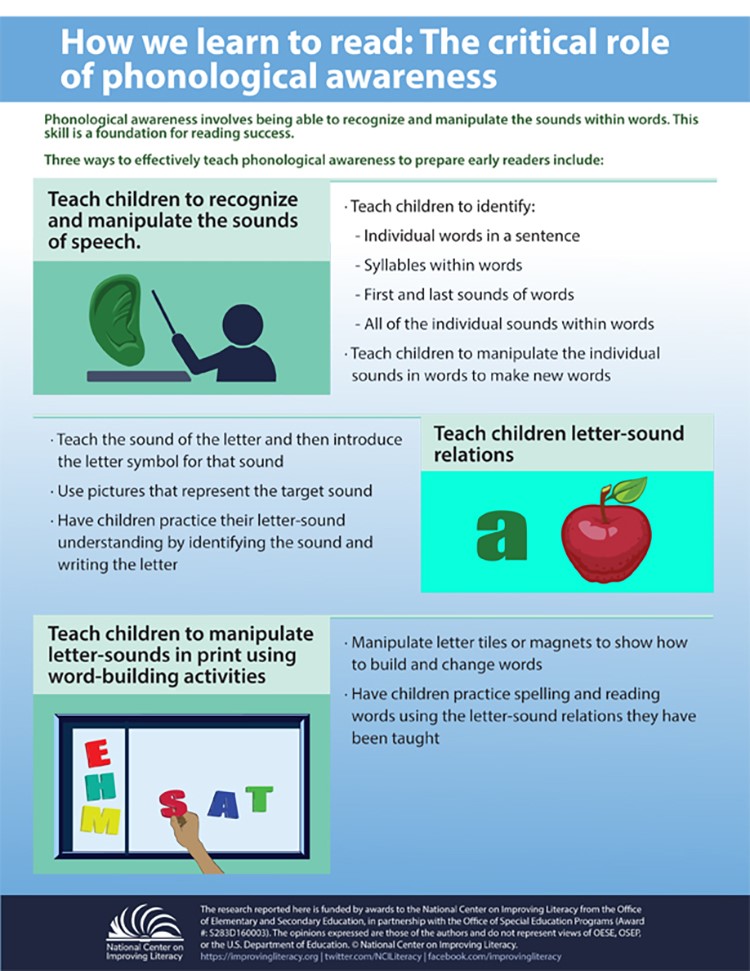Phonological Awareness: What Is It And Why Is It Important For Reading?
31st January 2024

When sounds are linked to the letters they represent, it is easier for students to learn how to recognize the sounds in words through instruction. As an educator, you would probably want to use the alphabetic principle essentially represented by mapping. A well-developed mapping enables readers to decode, or read, around 70% of the single-syllable words they will come across in literature. Furthermore, there's a very significant chance that readers who comprehend the alphabetic principle will read a word properly when they see it printed for the first time.
What Is Phonological Awareness?
Reading requires phonological awareness as a fundamental ability. Phonological awareness is associated with sounds, as the name suggests. It is the capacity to recognize and differentiate between phonemes inside a word. It also aids in the explanation of the various ways that sound functions inside a word.

Children without letters should be taught phonological awareness using either blocks or boxes that represent the sounds. Before learning the matching letters, kids must recognize and master those sounds. Once kids are familiar with even the tiniest sounds, they may combine them to read and segment words to improve their spelling.
Phonological awareness involves the following skills:
- Rhyming- when a student can identify words ending with the same sound
- Alliteration- when a student can identify similar sounds at the beginning of a word
- Syllables- when a student can identify and segment words in a sentence and syllables
- Rimes and Onset- The word's first sound is onset, while its last sound is rime Children are taught both of them so they may work together to read new words
- Phonemes- when a student can identify and understand the smallest unit of sound
Hey, do you follow us on Social Media? We regularly share upgraded educational content, tips, feedback and more. Check us out by clicking the profiles here - Facebook / Twitter / LinkedIn / Pinterest / Instagram / YouTube
Why Is Phonological Awareness Essential For Kids?
Here are a few reasons why phonological awareness is crucial for students while learning reading and spelling:
- Learn And Use The Alphabetic Code
Those who possess the fundamental ability to use the alphabetic principle can break down words into their component sounds, identify those sounds, and put those sounds back together. Students who are not aware of phonemes may find the print system and its representation of spoken language confusing.
Pupils who don't understand phonemes cannot even understand what is meant by the word sound. They may even be able to name the alphabet's letters and can hear most of the time, but they seldom or never know what the letters stand for.
- Predicts Later Outcomes In Spelling And Reading
The development of phoneme awareness aids in written word recognition. By the end of the third grade and beyond, we can predict with a high degree of accuracy whether a student will be a strong reader or a terrible reader even before they begin to read.
Simple assessments that gauge vocabulary, sound-symbol correspondence, letter names, and understanding of speech sounds in words can all be used to predict outcomes.
- Beneficial For Novice Readers
Reading and spelling problems are lessened and resolved with instruction in speech-sound awareness. Learning the alphabetic code is also accelerated by openly and immediately teaching speech sounds.
Therefore, phoneme awareness exercises should be a part of the curriculum for beginning readers in the classroom.
- Develops Vocabulary And Word Consciousness
You can carry out vocabulary-building activities with your students to help them learn better. These word-learning exercises require phonological awareness and memorization that will help them shortly. You can start by asking them to pay attention to new terms and contrasting them with existing ones.
Students can then get into the habit of accurately repeating and pronouncing words. You can introduce activities where they properly recall (encode) phrases so they may be recovered and utilized. These learning exercises will also allow them to separate similar-sounding terms so that their meanings may be compared.
Help Your Students Become Phonologically Strong
Phonological awareness plays a crucial role in the educational journey as it assists students in understanding words and sounds better. You can use various activities and learning exercises to help students read and learn better. Working with special educational needs might be a little tricky, but if you have pursued SEN course or ADHD courses online, you might be aware of the ways and methodologies to teach them right.
We believe education should be accessible for everyone. That’s why we don’t charge for our blogs. Find the right course that will help you in your career with us, contact us at - 6621056101. You can mail us at act@asiancollegeofteachers.com

